Happy Thursday! Election Day is 47 days away. At his Long Island rally last night, former President Donald Trump walked out to his signature “God Bless the USA” by Lee Greenwood and walked off the stage to “Nessun Dorma” from the opera Turandot. We do appreciate classical music in politics.
Up to Speed
- The Federal Reserve slashed interest rates by 0.5 percentage points Wednesday, or 50 basis points, the first cut since the beginning of the COVID-19 pandemic. The decision is the first sign of relief for borrowers since the central bank increased interest rates to fight inflation in 2022 and 2023—and kept them the same for the past year.
- Former President Donald Trump said at his Long Island rally Wednesday that he will visit Springfield, Ohio, “in the next two weeks,” as he has pushed baseless claims that Haitian migrants in the city are kidnapping and eating residents’ pets. The Republican mayor of Springfield, Rob Rue, didn’t seem thrilled by the prospect. “It would be an extreme strain on our resources. So it’d be fine with me if they decided not to make that visit,” he told reporters. Trump also committed to visiting Aurora, Colorado, a city in which he claims Venezuelan gangs are overruning apartment complexes.
- The International Brotherhood of Teamsters, a labor union with 1.3 million members throughout the country, decided on Wednesday not to endorse a candidate for president. “Unfortunately, neither major candidate was able to make serious commitments to our union to ensure the interests of working people are always put before Big Business,” union president Sean O’Brien said. “We sought commitments from both Trump and Harris not to interfere in critical union campaigns or core Teamsters industries—and to honor our members’ right to strike—but were unable to secure those pledges.” The announcement came the same day the union publicized polling data showing rank-and-file members prefer Biden over Donald Trump by 9 points but prefer the former president over Harris by 25 points and 27 points, respectively, in two surveys. Following O’Brien’s announcement, Teamsters affiliates in Michigan, Nevada, Pennsylvania, and Wisconsin went ahead and endorsed the vice president anyway.
- Republicans’ and Democrats’ chief House super PACs each launched a new round of ads Tuesday and Wednesday in battleground districts. Both organizations targeted a Republican-held seat in Arizona and two open seats in Michigan. The Republican Congressional Leadership Fund also hit districts in Nebraska, California, and North Carolina with ads focused on public safety and economics. Meanwhile, Democrats’ House Majority PAC’s ads mainly focus on abortion. This round comes after advertising releases from both organizations targeting other toss-up races.
The Legal Operation Trump Deems More Valuable than GOTV
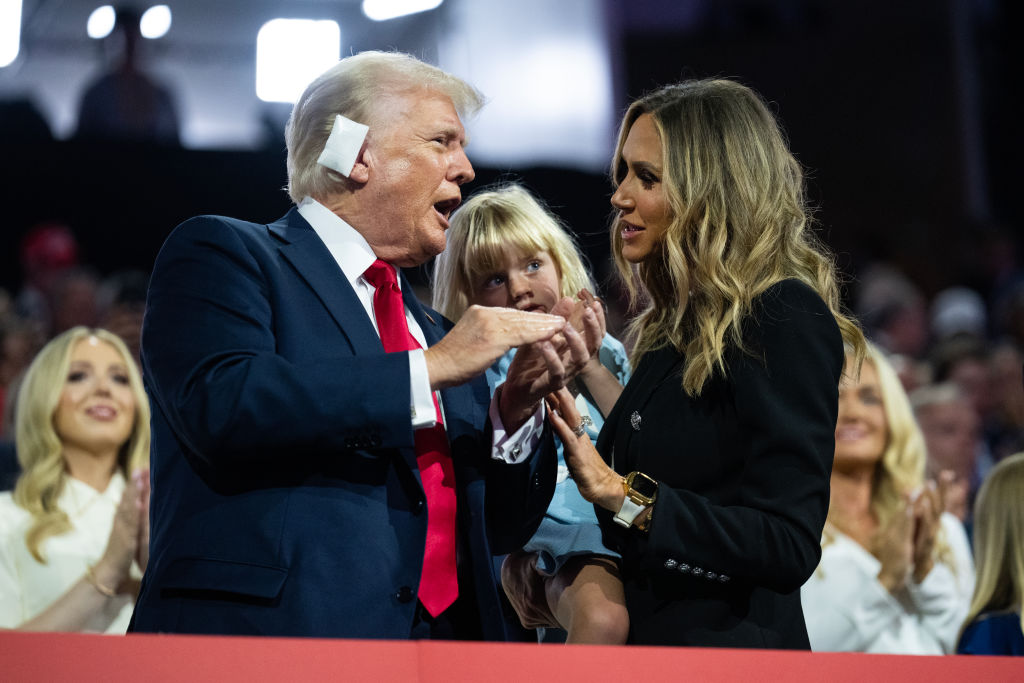
The Republican National Committee has increased by nearly half the number of election-related lawsuits filed this cycle compared to 2020. It’s the result of Donald Trump’s directive to shift resources and manpower from the party’s voter turnout program to an operation focused on fighting claims of ballot irregularities and unconstitutional state franchise laws.
RNC officials told Dispatch Politics that the party, in conjunction with the Republican nominee’s 2024 campaign, has recruited roughly 175,000 volunteers to execute its “election integrity” program, otherwise known as “Protect the Vote.” Bolstered by full-time staff deployed to 18 states, including the seven key presidential battleground states, these volunteers are lawyers and grassroots activists training as poll watchers and applying for jobs as poll workers.
Under this operation, the RNC has filed 115 lawsuits across 25 states, compared with 79 four years ago, and Election Day is still weeks away. And the committee says the program is showing results: Last week the Pennsylvania Supreme Court handed down a ruling requiring absentee ballots be dated to be counted, even if they are received on time.
Meanwhile, RNC legal actions are ongoing in the battleground states poised to decide the election, including in Georgia, Michigan, Nevada, and North Carolina. Some GOP lawsuits aim to overturn state laws and rules implemented via court decisions during the coronavirus pandemic, which they argue are unconstitutional. The operation is additionally concentrating on:
- Taking action to help ensure noncitizens don’t vote, which is already illegal, and help ensure voters show identification to vote where such laws are applicable
- Pushing states to update voter rolls (i.e., a state’s official list of verified, eligible voters)
- Taking action the RNC deems necessary to improve the security of mail-in ballots and ballot drop boxes
- Placing trained grassroots Trump supporters as observers at polling places and, where applicable, in the room where ballots are counted
- Training grassroots Trump supporters to apply for and obtain jobs at polling places
“We have created the first national election integrity program, we’re working very aggressively on that,” RNC Chairman Mike Whatley told reporters earlier this month during a news conference on the sidelines of the annual Republican Jewish Coalition conference in Las Vegas. “We feel very comfortable right now that this program is going to ensure that it’s easy to vote, hard to cheat.” Whatley served as RNC counsel before being elevated to chairman.
Early this year, the RNC under then-Chairwoman Ronna McDaniel was planning to build out the party’s traditional, quadrennial voter turnout program—a robust operation that helped Trump win in 2016 and helped him come just shy of reelection in 2020. But apparently convinced his loss to President Joe Biden was fraudulent, Trump preferred that the RNC—in conjunction with his campaign—abandon its usual field operation and instead focus on election integrity activities.
As a part of that shift, Trump pushed out McDaniel. At his urging, the RNC installed Whatley, then head of the North Carolina GOP, as chairman. Under Whatley and new co-RNC Chairwoman Lara Trump—the former president’s daughter-in-law—the party is outsourcing most voter turnout activities to supportive outside groups, although the RNC and the Trump campaign remain involved. Veteran Republican operatives who specialize in field strategy are critical of this move, to say the least.
They argue Trump is so consumed by his fear of cheating at the polls he has hamstrung his ability to turn out enough votes to defeat Harris. With the candidates neck-and-neck in national and battleground state polling, the campaign with better field capabilities could have a crucial advantage. That campaign belongs to the Democrats, Republican operatives have told Dispatch Politics over and over again, emphasizing they are unimpressed with the GOP-algined outside groups Trump is relying on for voter turnout.
“You can walk and chew gum at same time,” said a GOP insider critical of the approach, arguing the party’s proven voter turnout operation could have improved the party’s ability to fight irregularities and unconstitutional state election laws without gutting the field program. Whatley insists GOP efforts to get voters to the polls have not been undermined by the change of focus.
“We have a very robust turnout operation in place right now,” he said during the news conference at the RJC, in response to our question about RNC field strategy. “We are working every single day to make sure that we’re going to get out the vote that we need.”
North Carolina Campaign Ads Trickle In
RALEIGH, North Carolina—To be a television viewer in a swing state in a presidential election year is to know one thing: You cannot escape the political ads. They run at every commercial break. Ads from both sides in one race frequently run back-to-back, and viewers can expect to see the exact same ad airing multiple times an hour. As Election Day approaches, they may crowd out all other TV advertising, with spots on new cars and personal-injury lawyers unable to compete with campaigns and super PACs.
Still, there were not yet wall-to-wall political ads during the evening news broadcast on WRAL, Raleigh’s NBC affiliate, last night. After the first few stories on the station’s 5 p.m. news program—the Federal Reserve’s rate cut, a J.D. Vance rally in downtown Raleigh, and a local political operative participating in a “Republicans for Harris” event—the first commercial break featured ads for a Kia dealership, Bojangle’s fast food, and a local HVAC and plumbing company.
Then, the first campaign ad of the hour appeared. In it, Democratic state Senate candidate Terence Everitt promises to “protect women's rights, bring down costs, and fully fund our public schools.” The ad then ran several times over the next two hours, sometimes right alongside an anti-Everitt ad featuring Dr. Seuss-like imagery and rhyming. “He's running for Senate, and it's not a joke,” goes the voice-over. “Terence Everitt, he's just simply too woke.”
At the state level, “woke” is still a preferred epithet for Republicans to use against their Democratic rivals. One ad, from Republican nominee for governor Mark Robinson, accuses his opponent, “woke Josh Stein,” of failing to prosecute illegal immigrants as North Carolina’s attorney general. “Woke Josh Stein put his politics over your safety,” the ad closes.
But the Stein campaign’s ad going after Robinson is on far more frequently. As chilling piano music plays, superimposed text asks the viewer, “Is this who you want as your governor?” The rest of the ad features Robinson using violent rhetoric during his various political appearances over the years, ending with a scowling Robinson telling an unseen audience “Get mad at me if you want to, some folks need killing.” The ad repeats Robinson’s line for effect: “Some folks need killing.”
Ads for the nearby U.S. House race are also competing with each other—though in this case, the groups shelling out the money were dueling super PACs. About midway through the 5 p.m. newscast, the Republican-affiliated Congressional Leadership Fund ran an ad going after Democratic Rep. Don Davis for “not showing up for us” and urging voters to make “Don Davis disappear from Congress.” Airing immediately after that was an ad from House Majority PAC, the Democratic group, taking on Davis’s Republican opponent, Laurie Buckhout. The spot features a middle-aged white woman who warns that the “outsider” Buckhout would go to Congress to pass “a national abortion ban.”
“I'm from around here, but she's not,” the woman says.
It was not until later in the 5 p.m. hour, and more frequently in the 6 p.m. hour, that presidential ads began appearing. One Kamala Harris ad that aired frequently presents her economic proposals as “building up the middle class” in contrast to Donald Trump’s “tax cuts” for “corporations.” The other Harris campaign ad features a clip from last week’s debate, with the vice president delivering a direct-to-camera promise to “be a president for all Americans.”
The ads present the Democratic nominee to viewers as upbeat, populist, and vaguely forward-looking. (“A new way forward” is the tagline.) And they stand in contrast with the only Trump campaign ad running on WRAL last night, which is blunt and hits a single message: The economy was better under Trump. The ad begins with Harris herself declaring in a speech that “Bidenomics is working.”
“It's not,” a dramatic voice-over responds. “ABC News proved it with charts.” The ad shows the news network’s coverage of inflation rising during the Biden administration, and even includes a clip from Harris and Tim Walz’s joint interview with CNN, with anchor Dana Bash citing better economic conditions during the Trump administration.
The ad repeats the Harris claims that “Bidenomics is working” before the voiceover responds one more time: “No. It isn’t.”
The overall effect of a couple hours of watching the evening news broadcast is not quite overwhelming, but the dominance of political advertising is undeniable. It’s also clear that Harris and the Democrats are investing more in television than Trump and the Republicans, with Democratic ads outnumbering the GOP’s ads nearly 2-to-1 during the 5 p.m. hour on WRAL.
What impact will that advantage have in North Carolina and in the other swing states where similar slates of political ads are airing on network television? It’s impossible to know.
Eyes on the Trail
- Former President Trump, who hosted a rally in Long Island, New York, Wednesday evening, will participate in a “fighting anti-semitism in America event” in Washington, Thursday evening.
- Meanwhile, Vice President Kamala Harris will travel Thursday to Detroit to participate in a “Unite for America” livestreamed broadcast event hosted by celebrity media mogul Oprah Winfrey.
- Gov. Tim Walz and Sen. J.D. Vance will both appear at a closed-door meeting of the Business Roundtable in Washington today, speaking to some of the most powerful CEOs in the country.
- President Joe Biden will deliver remarks Thursday to the Economic Club of Washington. In the evening, Biden will address the Congressional Hispanic Caucus Institute 47thAnnual Awards Gala, also in the nation’s capital.
- Vivek Ramaswamy is hosting a Thursday evening town hall event in Springfield, Ohio. Ramaswamy, who hails from Cincinnati, lives in Columbus and is backing Trump, came up short in his bid for the 2024 GOP presidential nomination.
Notable and Quotable
“New York is Harris-Walz country. If Trump wants to waste his time campaigning in a state he lost by over 20 points, be my guest.”—New York Gov. Kathy Hochul reacting to former President Donald Trump’s rally on Long Island, September 18, 2024



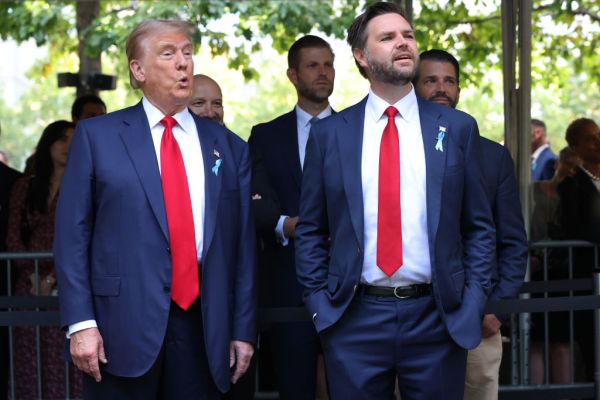
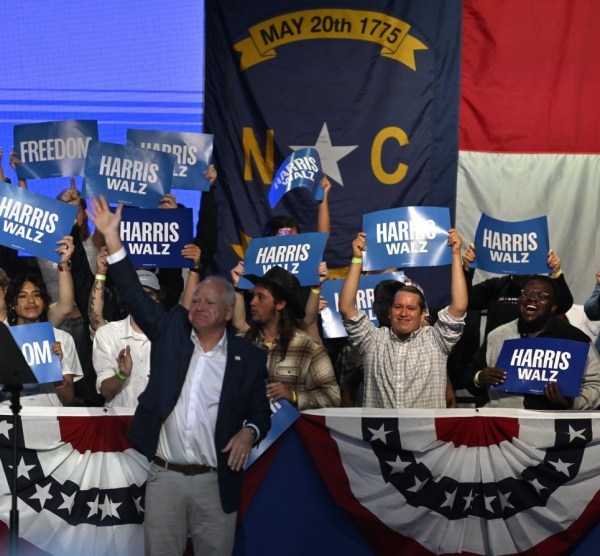
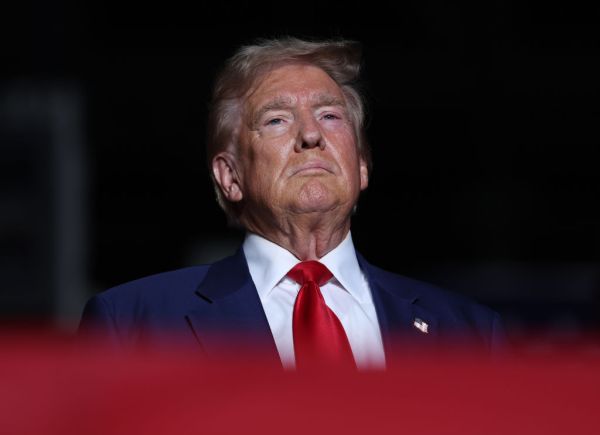
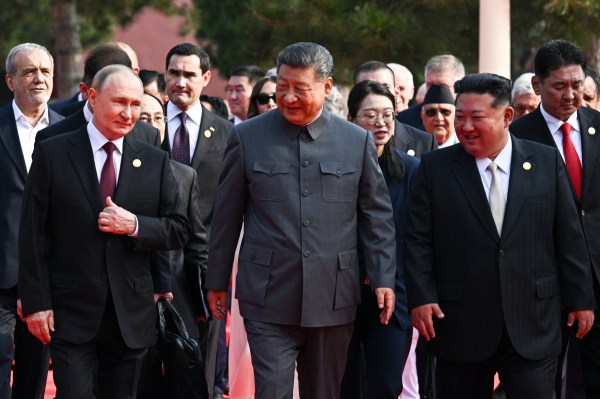
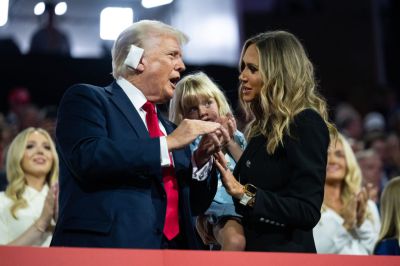
Please note that we at The Dispatch hold ourselves, our work, and our commenters to a higher standard than other places on the internet. We welcome comments that foster genuine debate or discussion—including comments critical of us or our work—but responses that include ad hominem attacks on fellow Dispatch members or are intended to stoke fear and anger may be moderated.
With your membership, you only have the ability to comment on The Morning Dispatch articles. Consider upgrading to join the conversation everywhere.